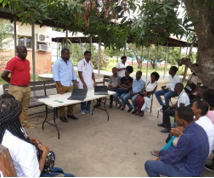Speeches Shim
Efficiencies for Clinical HIV Outcomes (ECHO) ![]() (pdf - 168k)
(pdf - 168k)
BACKGROUND
Mozambique has the eighth highest HIV prevalence in the world, and according to UNAIDS, 12.6% of the adult population is living with HIV. While the country has made strides in testing people for HIV and providing treatment, systemic challenges, such as the need to travel long distances to access care, long wait times in facilities, stigma, poor quality healthcare, and inadequate communication about the importance of staying on treatment have resulted in a high proportion of HIV-positive individuals discontinuing their treatment. As a consequence, Mozambique has among the highest HIV mortality rates in the world.
PROGRAM DESCRIPTION
The ECHO project works in four provinces to support the government to expand targeted HIV testing and ensure HIV-positive individuals receive treatment, stay in treatment, and reduce their viral load to bring the virus under control. ECHO achieves this by providing technical assistance, deploying hundreds of health workers, community workers, and data analysts to sites with poor performance, training government health workers, giving grants to community outreach organizations, and supporting the government to strengthen crucial laboratory, transport, and information systems. As the project progresses, ECHO will gradually transfer more responsibility for management of project activities to the government, especially at the health facility, district, and provincial levels, so the results can be sustained when the project ends.
EXPECTED RESULTS/IMPACTS
By 2024, ECHO will have contributed to HIV epidemic control in the four project provinces, meaning that 95% of Mozambicans with HIV know their status, 95% of HIV-positive individuals receive treatment, and 95% of those on treatment are virally suppressed. As a result, fewer people will get HIV or die from AIDS, and people with HIV will live healthier, more productive lives. The project will reach these goals by improving targeting of HIV testing, strengthening linkage to treatment once individuals are diagnosed, keeping more patients on treatment, and strengthening the viral load laboratory system to increase requests for tests and receive results more quickly. By the end of the project, ECHO will have supported the government to develop the capacity and systems to sustain these results.


Comment
Make a general inquiry or suggest an improvement.